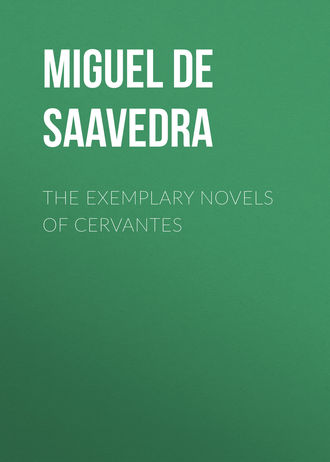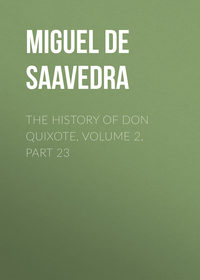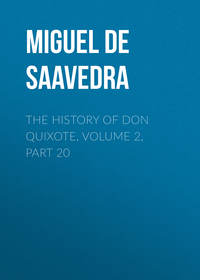 полная версия
полная версияThe Exemplary Novels of Cervantes
"Be this as it may, what mortifies me is that neither your mother nor myself, who were disciples of the great Camacha, ever came to know as much as she did, and that not for want of capacity, but through her inordinate selfishness, which could never endure that we should learn the higher mysteries of her art, and be as wise as herself. Your mother, my son, was called Montiela, and next to Camacha, she was the most famous of witches. My name is Cañizares; and, if not equal in proficiency to either of these two, at least I do not yield to them in good will to the art. It is true that in boldness of spirit, in the intrepidity with which she entered a circle, and remained enclosed in it with a legion of fiends, your mother was in no wise inferior to Camacha herself; while, for my part, I was always somewhat timid, and contented myself with conjuring half a legion; but though I say it that should not, in the matter of compounding witches' ointment, I would not turn my back upon either of them, no, nor upon any living who follow our rules. But you must know, my son, ever since I have felt how fast my life is hastening away upon the light wings of time, I have sought to withdraw from all the wickedness of witchcraft in which I was plunged for many years, and I have only amused myself with white magic, a practice so engaging that it is most difficult to forego it. Your mother acted in the same manner; she abandoned many evil practices, and performed many righteous works; but she would not relinquish white magic to the hour of her death. She had no malady, but died by the sorrow brought upon her by her mistress, Camacha, who hated her because she saw that in a short time Montiela would know as much as herself, unless indeed she had some other cause of jealousy not known to me.
"Your mother was pregnant, and her time being come, Camacha was her midwife. She received in her hands what your mother brought forth, and showed her that she had borne two puppy dogs. 'This is a bad business,' said Camacha; 'there is some knavery here. But, sister Montiela, I am your friend, and I will conceal this unfortunate birth; so have patience and get well, and be assured that your misfortune shall remain an inviolable secret.' I was present at this extraordinary occurrence, and was not less astounded than your mother. Camacha went away taking the whelps with her, and I remained to comfort the lying-in woman, who could not bring herself to believe what had happened. At last Camacha's end drew near, and when she felt herself at the point of death, she sent for her and told her how she had turned her sons into dogs on account of a certain grudge she bore her, but that she need not distress herself, for they would return to their natural forms when it was least expected; but this would not happen 'until they shall see the exalted quickly brought low, and the lowly exalted by an arm that is mighty to do it.'
"Your mother wrote down this prophecy, and deeply engraved it in her memory, and so did I, that I might impart it to one of you if ever the opportunity should present itself. And in hopes to recognise you, I have made it a practice to call every dog of your colour by your mother's name, to see if any of them would answer to one so unlike those usually given to dogs; and, this evening, when I saw you do so many things, and they called you the wise dog, and also when you looked up at me upon my calling to you in the yard, I believed that you were really the son of Montiela. It is with extreme pleasure I acquaint you with the history of your birth, and the manner in which you are to recover your original form. I wish it was as easy as it was for the golden ass of Apuleius, who had only to eat a rose for his restoration; but yours depends upon the actions of others, and not upon your own efforts. What you have to do meanwhile, my son, is to commend yourself heartily to God, and hope for the speedy and prosperous fulfilment of the prophecy; for since it was pronounced by Camacha it will be accomplished without any doubt, and you and your brother, if he is alive, will see yourselves as you would wish to be. All that grieves me is that I am so near my end, that I can have no hope of witnessing the joyful event.
"I have often longed to ask my goat how matters would turn out with you at last; but I had not the courage to do so, for he never gives a straightforward answer, but as crooked and perplexing as possible. That is always the way with our lord and master; there is no use in asking him anything, for with one truth he mingles a thousand lies, and from what I have noted of his replies it appears that he knows nothing for certain of the future, but only by way of conjecture. At the same time he so be-fools us that, in spite of a thousand treacherous tricks he plays us, we cannot shake off his influence. We go to see him a long way from here in a great field, where we meet a multitude of warlocks and witches, and are feasted without measure, and other things take place which, indeed and in truth, I cannot bring myself to mention, nor will I offend your chaste ears by repeating things so filthy and abominable. Many are of opinion that we frequent these assemblies only in imagination, wherein the demon presents to us the images of all those things which we afterwards relate as having occurred to us in reality; others, on the contrary, believe that we actually go to them in body and soul; and for my part I believe that both opinions are true, since we know not when we go in the one manner or in the other; for all that happens to us in imagination does so with such intensity, that it is impossible to distinguish between it and reality. Their worships the inquisitors have had sundry opportunities of investigating this matter, in the cases of some of us whom they have had under their hands, and I believe that they have ascertained the truth of what I state.
"I should like, my son, to shake off this sin, and I have exerted myself to that end. I have got myself appointed matron to this hospital; I tend the poor, and some die who afford me a livelihood either by what they leave me, or by what I find among their rags, through the great care I always take to examine them well. I say but few prayers, and only in public, but grumble a good deal in secret. It is better for me to be a hypocrite than an open sinner; for my present good works efface from the memory of those who know me the bad ones of my past life. After all, pretended sanctity injures no one but the person who practises it. Look you, Montiel, my son, my advice to you is this: be good all you can; but if you must be wicked, contrive all you can not to appear so. I am a witch, I do not deny it, and your mother was one likewise; but the appearances we put on were always enough to maintain our credit in the eyes of the whole world. Three days before she died, we were both present at a grand sabbath of witches in a valley of the Pyrenees; and yet when she died it was with such calmness and serenity, that were it not for some grimaces she made a quarter of an hour before she gave up the ghost, you would have thought she lay upon a bed of flowers. But her two children lay heavy at her heart, and even to her last gasp she never would forgive Camacha, such a resolute spirit she had. I closed her eyes and followed her to the grave, and there took my last look at her; though, indeed, I have not lost the hope of seeing her again before I die, for they say that several persons have met her going about the churchyards and the cross-roads in various forms, and who knows but I may fall in with her some time or other, and be able to ask her whether I can do anything for the relief of her conscience?"
Every word that the old hag uttered in praise of her she called my mother went like a knife to my heart; I longed to fall upon her and tear her to pieces, and only refrained from unwillingness that death should find her in such a wicked state. Finally she told me that she intended to anoint herself that night and go to one of their customary assemblies, and inquire of her master as to what was yet to befal me. I should have liked to ask her what were the ointments she made use of; and it seemed as though she read my thoughts, for she replied to my question as though it had been uttered.
"This ointment," she said, "is composed of the juices of exceedingly cold herbs, and not, as the vulgar assert, of the blood of children whom we strangle. And here you may be inclined to ask what pleasure or profit can it be to the devil to make us murder little innocents, since he knows that being baptised they go as sinless creatures to heaven, and every Christian soul that escapes him is to him a source of poignant anguish. I know not what answer to give to this except by quoting the old saying, that some people would give both their eyes to make their enemy lose one. He may do it for sake of the grief beyond imagination which the parents suffer from the murder of their children; but what is still more important to him is to accustom us to the repeated commission of such a cruel and perverse sin. And all this God allows by reason of our sinfulness; for without his permission, as I know by experience, the devil has not the power to hurt a pismire; and so true is this, that one day when I requested him to destroy a vineyard belonging to an enemy of mine, he told me that he could not hurt a leaf of it, for God would not allow him. Hence you may understand when you come to be a man, that all the casual evils that befal men, kingdoms, and cities, and peoples, sudden deaths, shipwrecks, devastations, and all sorts of losses and disasters, come from the hand of the Almighty, and by his sovereign permission; and the evils which fall under the denomination of crime, are caused by ourselves. God is without sin, whence it follows that we ourselves are the authors of sin, forming it in thought, word, and deed; God permitting all this by reason of our sinfulness, as I have already said.
"Possibly you will ask, my son, if so be you understand me, who made me a theologian? And mayhap you will say to yourself, Confound the old hag! why does not she leave off being a witch since she knows so much? Why does not she turn to God, since she knows that he is readier to forgive sin than to permit it? To this I reply, as though you had put the question to me, that the habit of sinning becomes a second nature, and that of being a witch transforms itself into flesh and blood; and amidst all its ardour, which is great, it brings with it a chilling influence which so overcomes the soul as to freeze and benumb its faith, whence follows a forgetfulness of itself, and it remembers neither the terrors with which God threatens it, nor the glories with which he allures it. In fact, as sin is fleshly and sensual, it must exhaust and stupefy all the feelings, and render the soul incapable of rising to embrace any good thought, or to clasp the hand which God in his mercy continually holds out to it. I have one of those souls I have described; I see it clearly; but the empire of the senses enchains my will, and I have ever been and ever shall be bad.
"But let us quit this subject, and go back to that of our unguents. They are of so cold a nature that they take away all our senses when we anoint ourselves with them; we remain stretched on the ground, and then they say we experience all those things in imagination which we suppose to occur to us in reality. Sometimes after we have anointed and changed ourselves into fowls, foals, or deer, we go to the place where our master awaits us. There we recover our own forms and enjoy pleasures which I will not describe, for they are such as the memory is ashamed to recal, and the tongue refuses to relate. The short and the long of it is, I am a witch, and cover my many delinquencies with the cloak of hypocrisy. It is true that if some esteem and honour me as a good woman, there are many who bawl in my ear the name imprinted upon your mother and me by order of an ill-tempered judge, who committed his wrath to the hands of the hangman; and the latter, not being bribed, used his plenary power upon our shoulders. But that is past and gone; and all things pass, memories wear out, lives do not renew themselves, tongues grow tired, and new events make their predecessors forgotten. I am matron of a hospital; my behaviour is plausible in appearance; my unguents procure me some pleasant moments, and I am not so old but that I may live another year, my age being seventy-five. I cannot fast on account of my years, nor pray on account of the swimming in my head, nor go on pilgrimages for the weakness of my legs, nor give alms because I am poor, nor think rightly because I am given to back-biting, and to be able to backbite one must first think evil. I know for all that that God is good and merciful, and that he knows what is in store for me, and that is enough; so let us drop this conversation which really makes me melancholy. Come, my son, and see me anoint myself; for there is a cure for every sorrow; and though the pleasures which the devil affords us are illusive and fictitious, yet they appear to us to be pleasures; and sensual delight is much greater in imagination than in actual fruition, though it is otherwise with true joys."
After this long harangue she got up, and taking the lamp went into another and smaller room. I followed her, filled with a thousand conflicting thoughts, and amazed at what I had heard and what I expected to see. Cañizares hung the lamp against the wall, hastily stripped herself to her shift, took a jug from a corner, put her hand into it, and, muttering between her teeth, anointed herself from her feet to the crown of her head. Before she had finished she said to me, that whether her body remained senseless in that room, or whether it quitted it, I was not to be frightened, nor fail to wait there till morning, when she would bring me word of what was to befal me until I should be a man. I signified my assent by drooping my head; and she finished her unction, and stretched herself on the floor like a corpse. I put my mouth to hers, and perceived that she did not breathe at all. One thing I must own to you, friend Scipio, that I was terribly frightened at seeing myself shut up in that narrow room with that figure before me, which I will describe to you as well as I can.
She was more than six feet high, a mere skeleton covered with a black wrinkled skin. Her dugs were like two dried and puckered ox-bladders; her lips were blackened; her long teeth locked together; her nose was hooked; her eyes starting from her head; her hair hung in elf-locks on her hollow wrinkled cheeks; – in short, she was all over diabolically hideous. I remained gazing on her for a while, and felt myself overcome with horror as I contemplated the hideous spectacle of her body, and the worse occupation of her soul. I wanted to bite her to see if she would come to herself, but I could not find a spot on her whole body that did not fill me with disgust. Nevertheless, I seized her by one heel, and dragged her to the yard, without her ever giving any sign of feeling. There seeing myself at large with the sky above me, my fear left me, or at least abated, so much as to give me courage to await the result of that wicked woman's expedition, and the news she was to bring me. Meanwhile, I asked myself, how comes this old woman to be at once so knowing and so wicked? How is it that she can so well distinguish between casual and culpable evils? How is it that she understands and speaks so much about God, and acts so much from the prompting of the devil? How is it that she sins so much from choice, not having the excuse of ignorance?
In these reflections I passed the night. The day dawned and found us both in the court, she lying still insensible, and I on my haunches beside her, attentively watching her hideous countenance. The people of the hospital came out, and seeing this spectacle, some of them exclaimed, "The pious Cañizares is dead! See how emaciated she is with fasting and penance." Others felt her pulse, and finding that she was not dead, concluded that she was in a trance of holy ecstacy; whilst others said, "This old hag is unquestionably a witch, and is no doubt anointed, for saints are never seen in such an indecent condition when they are lost in religious ecstacy; and among us who know her, she has hitherto had the reputation of a witch rather than a saint." Some curious inquirers went so far as to stick pins in her flesh up to the head, yet without ever awaking her. It was not till seven o'clock that she came to herself; and then finding how she was stuck over with pins, bitten in the heels, and her back flayed by being dragged from her room, and seeing so many eyes intently fixed upon her, she rightly concluded that I had been the cause of her exposure. "What, you thankless, ignorant, malicious villain," she cried, "is this my reward for the acts I did for your mother and those I intended to do for you?" Finding myself in peril of my life under the talons of that ferocious harpy, I shook her off, and seizing her by her wrinkled flank, I worried and dragged her all about the yard, whilst she shrieked for help from the fangs of that evil spirit. At these words, most present believed that I must be one of those fiends who are continually at enmity with good Christians. Some were for sprinkling me with holy water, some were for pulling me off the old woman, but durst not; others bawled out words to exorcise me. The witch howled, I tightened my grip with my teeth, the confusion increased, and my master was in despair, hearing it said that I was a fiend. A few who knew nothing of exorcisms caught up three or four sticks and began to baste me. Not liking the joke, I let go the old woman; in three bounds I was in the street, and in a few more I was outside the town, pursued by a host of boys, shouting, "Out of the way! the wise dog is gone mad." Others said "he is not mad, but he is the devil in the form of a dog." The people of the place were confirmed in their belief that I was a devil by the tricks they had seen me perform, by the words spoken by the old woman when she woke out of her infernal trance, and by the extraordinary speed with which I shot away from them, so that I seemed to vanish from before them like a being of the other world. In six hours I cleared twelve leagues; and arrived at a camp of gipsies in a field near Granada. There I rested awhile, for some of the gipsies who recognised me as the wise dog, received me with great delight, and hid me in a cave, that I might not be found if any one came in search of me; their intention being, as I afterwards learned, to make money by me as my master the drummer had done. I remained twenty days among them, during which I observed their habits and ways of life; and these are so remarkable that I must give you an account of them.
Scip. Before you go any further, Berganza, we had better consider what the witch said to you, and see if there can possibly be a grain of truth in the great lie to which you give credit. Now, what an enormous absurdity it would be to believe that Camacha could change human beings into brutes, or that the sacristan served her for years under the form of an ass. All these things, and the like, are cheats, lies, or illusions of the devil; and if it now seems to ourselves that we have some understanding and reason – since we speak, though we are really dogs or bear that form – we have already said that this is a portentous and unparalleled case; and though it is palpably before us, yet we must suspend our belief until the event determines what it should be. Shall I make this more plain to you? Consider upon what frivolous things Camacha declared our restoration to depend, and that what seems a prophecy to you is nothing but a fable, or one of those old woman's tales, such as the headless horse, and the wand of virtues, which are told by the fireside in the long winter nights; for were it anything else it would already have been accomplished, unless, indeed, it is to be taken in what I have heard called an allegorical sense: that is to say, a sense which is not the same as that which the letter imports, but which, though differing from it, yet resembles it. Now for your prophecy: – "They are to recover their true forms when they shall see the exalted quickly brought low, and the lowly exalted by a hand that is mighty to do it." If we take this in the sense I have mentioned, it seems to me to mean that we shall recover our forms when we shall see those who yesterday were at the top of fortune's wheel, to-day cast down in the mire, and held of little account by those who most esteemed them; so, likewise, when we shall see others who, but two hours ago, seemed sent into the world only to figure as units in the sum of its population, and now are lifted up to the very summit of prosperity. Now, if our return, as you say, to human form, were to depend on this, why we have already seen it, and we see it every hour. I infer, then, that Camacha's words are to be taken, not in an allegorical, but in a literal, sense; but this will help us out no better, since we have many times seen what they say, and we are still dogs, as you see. And so Carnacha was a cheat, Cañizares an artful hag, and Montiela a fool and a rogue – be it said without offence, if by chance she was the mother of us both, or yours, for I won't have her for mine. Furthermore, I say that the true meaning is a game of nine-pins, in which those that stand up are quickly knocked down, and the fallen are set up again, and that by a hand that is able to do it. Now think whether or not in the course of our lives we have ever seen a game of nine-pins, or having seen it, have therefore been changed into men.
Berg. I quite agree with you Scipio, and have a higher opinion of your judgment than ever. From all you have said, I am come to think and believe that all that has happened to us hitherto, and that is now happening, is a dream; but let us not therefore fail to enjoy this blessing of speech, and the great excellence of holding human discourse all the time we may; and so let it not weary you to hear me relate what befel me with the gipsies who hid me in the cave.
Scip. With great pleasure. I will listen to you, that you in your turn may listen to me, when I relate, if heaven pleases, the events of my life.
Berg. My occupation among the gipsies was to contemplate their numberless tricks and frauds, and the thefts they all commit from the time they are out of leading-strings and can walk alone. You know what a multitude there is of them dispersed all over Spain. They all know each other, keep up a constant intelligence among themselves, and reciprocally pass off and carry away the articles they have purloined. They render less obedience to their king than to one of their own people whom they style count, and who bears the surname of Maldonado, as do all his descendants. This is not because they come of that noble line, but because a page belonging to a cavalier of that name fell in love with a beautiful gipsy, who would not yield to his wishes unless he became a gipsy and made her his wife. The page did so, and was so much liked by the other gipsies, that they chose him for their lord, yielded him obedience, and in token of vassalage rendered to him a portion of everything they stole, whatever it might be.
To give a colour to their idleness the gipsies employ themselves in working in iron, and you may always see them hawking pincers, tongs, hammers, fire-shovels, and so forth, the sale of which facilitates their thefts. The women are all midwives, and in this they have the advantage over others, for they bring forth without cost or attendants. They wash their new-born infants in cold water, and accustom them from birth to death to endure every inclemency of weather. Hence they are all strong, robust, nimble leapers, runners, and dancers. They always marry among themselves, in order that their bad practices may not come to be known, except by their own people. The women are well behaved to their husbands, and few of them intrigue except with persons of their own race. When they seek for alms, it is rather by tricks and juggling than by appeals to charity; and as no one puts faith in them, they keep none, but own themselves downright vagabonds; nor do I remember to have ever seen a gipsy-woman taking the sacrament, though I have often been in the churches. The only thoughts of their minds are how to cheat and steal. They are fond of talking about their thefts and how they effected them. A gipsy, for instance, related one day in my presence how he had swindled a countryman as you shall hear:









